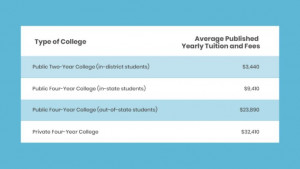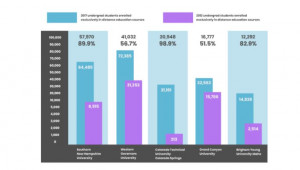Best Online Colleges in New York for 2026
Get detailed info on Best Online Colleges in New York and their online degrees, financial aid and scholarships, acceptance rate, tuition and fees.
The Best Community Colleges in New York
Get detailed information about the best community colleges in New York and their tuition cost, enrollment numbers, available credits, scholarships, and much more.
If you’re thinking about going to community college, congratulations!
Attending community college is an excellent way to jumpstart your education without breaking the bank, take some continuing education credits, learn a new skill or hobby, or even get a whole separate degree.
Before you can start your degree program, however, you have to decide what school you want to attend.
In this article, we’ll walk you through the best community colleges in New York. We’ll also talk about what to look for in a school and what benefits community colleges have over traditional universities.
Let’s dive in.
Community college vs. a university
Let’s take a look at the difference between a community college and a traditional four-year university.
Ultimately, the main difference between community colleges and universities is that most degrees in the community college environment take just two years to complete. Degrees at a four-year university, meanwhile, usually take four years to complete.
When students attend a four-year university, they often spend the first two years of their education taking general education requirements like math, history, and liberal arts courses.
All students do this regardless of what they want to study later. In fact, students in most four-year programs often do not even get into the “meat” of their chosen courses until the third year of their studies.
As such, students who want to streamline their education may choose to do the first two years of general education requirements in a community college environment first before transferring to a four-year college.
In most cases, the general education courses taken at a community college will transfer into a four-year university, allowing students to get a headstart on their degree. Students who begin their studies at a community college usually enter a university at the junior level, meaning they only need two additional years of study to obtain a degree.
Another thing that separates community colleges from universities is the accessibility of the courses.
While public universities usually offer adult education or continuing education courses, the prices tend to be much steeper than those offered at a community college.
Community colleges also offer a smaller campus size and additional study options like certificates and associate degrees.
What about vocational schools?
While community colleges and vocational schools share some similarities, they are not the same thing. Community colleges offer a wide array of topics and programs to study, while vocational schools focus on one specific skill.
Examples include auto-repair schools, culinary institutes, or plumbing and electrical programs.
Students typically graduate from these programs with an associate degree or certificate in their chosen field.
10 tips for finding the right community college
Finding the right degree program for you requires some due diligence. Follow these tips to find the correct certificate program or online associate option for you:
1. Check the school’s average tuition fees
Budget is an important consideration for anyone shopping for an online learning opportunity.
While community colleges tend to be more affordable than four-year universities, the average tuition between various community colleges can vary widely.
With that in mind, be sure to shop around for a program that suits your budget and financial requirements. If you want to offset the costs, you can also check out scholarships and other financial aid options, such as grants or loans.
2. Consider the school’s course options
Ultimately, the best school for you is the one that offers the classes you want to take.
Since most community colleges offer a wide selection of available courses, take your time combing through their course catalogs. Make sure the school offers the courses you’re interested in at times that will work for you.
If the course requires prerequisites, make sure you have or can obtain the needed courses before you enroll.
3. Check the school’s education statistics
Before you decide to enroll in a community college, search for stats like enrollment numbers, cost-per-credit, and graduation rate.
You’ll also want to check out education statistics, like the total number of programs available and required GED scores.
4. Look for online associate options
If you’re interested in studying virtually, look for a college that offers an online associate option.
An online program is an excellent option for anyone seeking a flexible schedule that can accommodate a full-time job, family responsibilities, or other commitments.
Plus, online education has become more popular in recent years, so you’ll be in good company.
5. Speak to a faculty member
As a prospective student, you’ll want to learn as much as you can about the community college you’re interested in attending. This is true whether you’re attending a technical college, seeking out a nursing program, or pursuing any other type of degree.
If you can, meet with a faculty member or another student to learn about the program and the courses offered.
6. Learn about admission requirements
Different community college academic programs have different admission requirements. As such, make sure to do your due diligence before you apply.
Learn about the admission requirements of the college you’re interested in. Pay special attention to things like testing requirements, required GED or SAT scores, and prerequisite courses required for your desired course of study.
7. Consider sitting in on a class
Most community colleges allow prospective students to sit in on a class if they’re considering registering. Go to the registrar’s office to learn more about audit opportunities and to browse a list of classes available.
Sitting in on a course is a great way to get a feel for the school, the faculty, and the other students in the program.
8. Consider industry options
If you want to go into a highly specialized field like nursing, plumbing, or auto repair, consider attending a vocational or technical school instead of a community college.
Vocational schools may streamline the educational path for professionals who know what they want to be and are anxious to get to work in their chosen industry.
9. Talk to an advisor
Once you’ve found a college you like, schedule a meeting with an academic advisor. The advisor will help you learn more about the program, its requirements, and its timeline.
The advisor is also an excellent resource for getting answers to your questions, sorting out financial aid options, and more.
10. Consider transfer options
If you intend to transfer after community college, make sure the college you attend has a transfer agreement with your chosen university. This promises your credits will transfer and that you won’t lose any course hours in the process.
A note on accreditation
If you’re planning to attend a community college, you can’t afford to overlook the importance of accreditation.
At the community college level, just like the university level, accreditation is a good indicator of quality. This is because accredited schools must comply with standards established by accreditation agencies.
Getting a diploma or degree from an accredited school also frees you up to transfer to a four-year college or university later, if that’s the path you choose to pursue.
Top community colleges in New York
Whether you’re an international student looking for a liberal arts program or a pre-med student seeking a nursing program, these New York community colleges are a great place to study.
Browse our list of the top options below:

1 New York University (NYU)
New York, New York
Institution Type: Private Not-For-Profit
Financial Aid Percentage: 51%
Average Financial Aid: $32,505
Acceptance Rate: 32.00
Total Programs Offered (35)
7
Business Management Programs
6
Health Science Programs
5
Law Programs
17
Other Programs
New York University, a private research university that has its accreditation from the Middle States Commission on Higher Education (MSCHE). It offers more than 230 areas of study to undergraduate students.
It provides online learning that is taught by the same faculty who teach on-campus. It conducts “Fertitta Veterans Programs” which is an innovative program for the U.S. military veterans and active members to help them professionally, academically and financially.
NYU awards scholarships above $35,000 to the first year students. Around 96% of the graduates get into jobs or continue with their studies within 6 months of their graduation. The starting package for salary on an average is around $60,478 for the graduates.
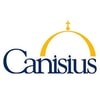
2 Canisius College
Buffalo, New York
Institution Type: Private Not-For-Profit
Financial Aid Percentage: 99%
Average Financial Aid: $26,003
Acceptance Rate: 78.00
Total Programs Offered (18)
13
Education Programs
4
Health Science Programs
1
Biology Program
Canisius College is a private Jesuit college which has its accreditation from the Middle States Association Commission on Higher Education (MSACHE). It offers more than 100 minors, majors and special programs and 34 Master’s certificate programs.
It provides over 13 online programs that give real-world experiences and learning opportunities. It participates in the Yellow Ribbon Program and helps the military veterans and their dependents to complete their education.
The college awards more than $45 million in the form of merit scholarships for their academic performance to the incoming students. Canisius has more than 100 student clubs and organizations for the students to be a part of. It also has 29 intramural teams.
3 Niagara University
Lewiston , New York
Institution Type: Private Not-For-Profit
Financial Aid Percentage: 99%
Average Financial Aid: $23,323
Acceptance Rate: 83.00
Total Programs Offered (8)
7
Education Programs
1
Business Management Program
Niagara University, a private Catholic university has its accreditation from the Middle States Commission on Higher Education (MSCHE). It offers various major and minor programs in areas like Education and Counselling, Business Administration, Art, etc.
Niagara University gives online learning which is an opportunity for the students to take up courses completely online. It is known as one of the best colleges for military members and proudly serves them. It also participates in the Yellow Ribbon Program.
Around 98% of the students get some type of financial help that includes federal, private and university awards. Several scholarships are awarded by the university such as Niagara Trustees Scholarships which is worth $23,000, NU Presidential Scholarships which is worth $20,000, etc.

4 Stony Brook University
Long Island, New York
Institution Type: Public
Financial Aid Percentage: 68%
Average Financial Aid: $9,723
Acceptance Rate: 41.00
Total Programs Offered (29)
22
Nursing Programs
4
Education Programs
1
Business Management Program
2
Other Programs
Stony Brook University is a public university that has its accreditation from the Middle States Commission on Higher Education (MSCHE). It offers over 60 majors and 80 minors in areas like Computer Science, Biochemistry, Biology, Psychology, etc.
It provides online learning without any boundaries with flexible programs and taught by supportive faculty. The students can take up courses like Business Administration, Liberal Studies, Nursing, etc. The university provides a supportive environment for the military members to pursue their education.
The annual tuition for NYS resident is $6,870 and for out-of-state residents is $24,540. About 78% of the full-time freshmen receive financial aid of $13,100 on an average.
The university has around 350 recognized clubs and organizations for the development of students. These clubs include cultural, spiritual, academic, media, sports, etc.

5 St. John's University
Long Island, New York
Institution Type: Private Not-For-Profit
Financial Aid Percentage: 100%
Average Financial Aid: $24,963
Acceptance Rate: 63.00
Total Programs Offered (33)
13
Education Programs
9
Accounting Programs
5
Business Management Programs
6
Other Programs
St. John’s University is a private, not-for-profit institution that is accredited by the Middle State Commission on Higher Education (MSCHE). It offers Master’s, Doctorate, Post Baccalaureate certificate, and Graduate Certificate in Accounting, Business Management, Criminal Justice, Education, Human Services, and more which are taught by knowledgeable, and experienced faculty.
It offers generous transfer scholarships to qualifying students, as well as expedited admission decision and credit evaluation to transfer applicants. The offices and programs listed in academic resources are designed to promote student success both inside and outside of the classroom, give self-awareness, vocation administrations, guiding and dispensed one individual counselor to every student.
This institute has been ranked 1st among “Catholic institutions in the nation” on the list of colleges with the “Highest student-mobility rates” by U.S. News and World Report.
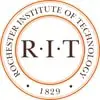
6 Rochester Institute of Technology (RIT)
Rochester, New York
Institution Type: Private Not-For-Profit
Financial Aid Percentage: 91%
Average Financial Aid: $21,682
Acceptance Rate: 55.00
Total Programs Offered (42)
12
Business Management Programs
8
Applied Science Programs
4
Health Science Programs
18
Other Programs
Rochester Institute of Technology is a private, not-for-profit institution known for its creativity and innovation, co-op and careers global focus which is regionally accredited by the Middle State Commission on Higher Education (MSCHE). It offers Associate, Bachelor’s, Master’s, Undergraduate and Graduate Certificate in Media Studies, Design, Information Technology, Computer Science, Environmental Science, and more which are handled by overall 1502 faculty members.
RIT is the third largest leader in providing undergraduates STEM (Science, Technology, Engineering, Mathematics) degrees among all private institutions in the country. In recent past years, 95% of RIT graduate students enter either the workforce or graduate study within 6 months of graduation.
The office of Financial Aid and Scholarships department provided around $111k plus in scholarships. Almost all the students receive some type of financial aid here.
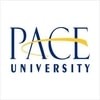
7 Pace University
New York City, New York
Institution Type: Private For-Profit
Financial Aid Percentage: 94%
Average Financial Aid: $27,228
Acceptance Rate: 84.00
Total Programs Offered (32)
8
Information Technology Programs
8
Business Management Programs
6
Information Systems Programs
10
Other Programs
Pace University is a private, for-profit institution which is accredited by the Middle State Commission on Higher Education (MSCHE). It offers Associate, Bachelor’s, and Undergraduate Certificate in various disciplines like Business Management, Computer Science, Education, Nursing, Media Studies, and many more.
It offers a generous financial aid program to its undergraduate and graduate students. Financial assistance is given in many forms, including scholarships and grants, federal work study, and student loans.
This institute support veterans and their dependents by providing veterans scholarship to undergraduate and graduate students. Admitted veteran students are eligible to receive need-based financial aid as well as benefits such as the GI Bill, Yellow Ribbon Program, etc.
The university is nationally top-ranked for its online bachelor’s degree programs according to U.S. News and World Report.

8 Syracuse University
Syracuse, New York
Institution Type: Private Not-For-Profit
Financial Aid Percentage: 67%
Average Financial Aid: $29,222
Acceptance Rate: 52.00
Total Programs Offered (28)
10
Information Systems Programs
10
Business Management Programs
3
Computer Science Programs
5
Other Programs
Syracuse University is a private, not-for-profit institution which is regionally accredited by the Middle State Commission on Higher Education (MSCHE). It offers Associate, Bachelor’s, Master’s, and Certificate in Public Administration, Computer Science, Arts, Business Management and many more.
The institute guarantees to provide 75% of their students with some kind of financial support in the form of institutional scholarships, federal aid, state aid, private loans, etc. The university awarded nearly $270 million in scholarships and grants to its students.
The institute has been ranked 53rd among the “Best National University” according to U.S. News and World Report. It also offers numerous highly-ranked programs and co-curricular opportunities for its students to prosper.
The institute has a quarter of a million alumni in 171 countries and they are always ready to help current and prospective students with internships and other learning opportunities, and placement.
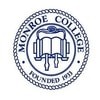
9 Monroe College
Bronx, New York
Institution Type: Private For-Profit
Financial Aid Percentage: 94%
Average Financial Aid: $10,857
Acceptance Rate: 53.00
Total Programs Offered (19)
8
Business Management Programs
3
Criminal Justice Programs
3
Health Science Programs
5
Other Programs
Monroe College is a private, for-profit institute which is accredited by the Middle State Commission on Higher Education (MSCHE). It offers Associates, Bachelors, Masters in various disciplines such as Human Services, Business Management, Computer Science, Health Sciences, and many more.
The Office of Career Services provides expert advice and valuable services to help currently enrolled students as well as alumni, employers, faculty, and staff. It also helps all students with internship coordination, job interview preparation, branding workshops, social media workshops.
The institute has financial services counselors who are always available to guide the students and help identify the resources available for them to make their education affordable and continue the education without any hassle.
Monroe is recognized as a leader in providing a focused, career-oriented, quality education that integrates classroom learning with real-world experience and faculty are not just professors; they are mentors, motivators, and members of the family.
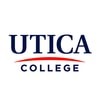
10 Utica College
Utica, New York
Institution Type: Private Not-For-Profit
Financial Aid Percentage: 98%
Average Financial Aid: $23,803
Acceptance Rate: 82.00
Total Programs Offered (28)
13
Information Technology Programs
4
Business Management Programs
3
Criminal Justice Programs
8
Other Programs
Utica College is a private, not-for-profit institution which is accredited by the Middle State Commission on Higher Education (MSCHE). It offers Bachelor's, Master’s, Doctorate, Undergraduate Certificate, and Graduate Certificate in Nursing, Criminal Justice, Business Management, Computer Science, Health Science, and many more at an affordable cost.
The veteran’s office of the college provides benefits to those students who belong to military families. Veteran counselor of the college is always available to guide the students in availing student benefits like GI bill, Montgomery, Vietnam Era Gi Bill, etc.
Every year almost 95% of Utica College students receive some form of financial aid.
According to the New York Times, the college graduates are in the top third of earners nationally.
The institute has many clubs and organizations such as the Student Organization, Student Government Association, Leadership Opportunities, Residence Hall Association, etc. for its students.
Conclusion
If you’re looking for an online associate degree that fits your budget, schedule, and preferences, then a community college could be the perfect option for you.
The College Monk is here to help you navigate the world of community colleges in New York and around the country.
Check out our website to learn more about community colleges, online college options, tuition costs, scholarships, and more.
